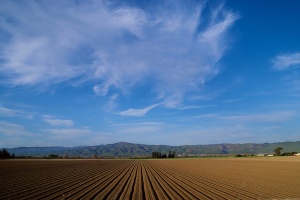What is it to be a farmer? Is farming about yields, faith or something more?
In his third book To a God Unknown, John Steinbeck explores Joseph Wayne’s relationship with the environment. With a farm struggling to support his family, Joseph leaves Vermont and his dying father for the riches of California. He settles in the lush Naestra Señora valley where he is determined to care for his property and prosper.
Image: Soledad, CA by vision63 (Russell Mondy) is licensed under CC BY-NC 2.0
The locals in town are less optimistic, having lived through both drought and abundance. But in Joseph’s mind, if he can maintain a spiritual relationship with his land – the rocks, plants, streams and animals that inhabit it – and incorporate good farming practices, he cannot fail.
Steinbeck writes evocatively about place. Here he highlights how a large oak tree comes to embody the spirit of Joseph’s beloved father, who has died, and how this connection nourishes the son:
“Joseph raised his head and looked at its old, wrinkled limbs. His eyes lighted with recognition and welcome, for his father’s strong and simple being, which had dwelt in his youth like a cloud of peace, had entered the tree.”
“I’m glad you’ve come, sir. I didn’t know until now how lonely I’ve been for you. It is good land, you see. You’ll like to be staying.”
Community
As time passes, Joseph marries and his three brothers head west with their families. They purchase adjoining parcels of land, live and work side by side, and prosper.
Until brother Barton intervenes.
A pious and mostly celibate man, he is threatened by Joseph’s supposed pagan rituals, communing with his father’s spirit and making offerings to the tree. As this goes against Barton’s Christian beliefs, he casts the first stone, ringbarking the sacred oak tree, which dies.
This action spells disaster for the valley, bringing famine, drought and death to the Wayne clan. So dire is the situation that they and other families leave their homes and move cattle over 100 miles away to greener pastures. But Joseph cannot forsake his land or abandon hope, and will do everything in his power to bring back the rain.
To a God Unknown shows how a sensitive farmer faces his fate and is misunderstood by the community. Unlike the indigenous and other folk he meets, they and Father Angelo, the local priest, believe that unless Joseph changes his ways he will upset their god and harm them.
While Steinbeck sides unapologetically with the maverick farmer, I cannot help thinking that Joseph is a casualty of the times. When ingrained views prevail and there is no room for dissent.
Image: Mission Soledad by vison63 (Russell Mondy) is licensed under CC BY-NC 2.0.

